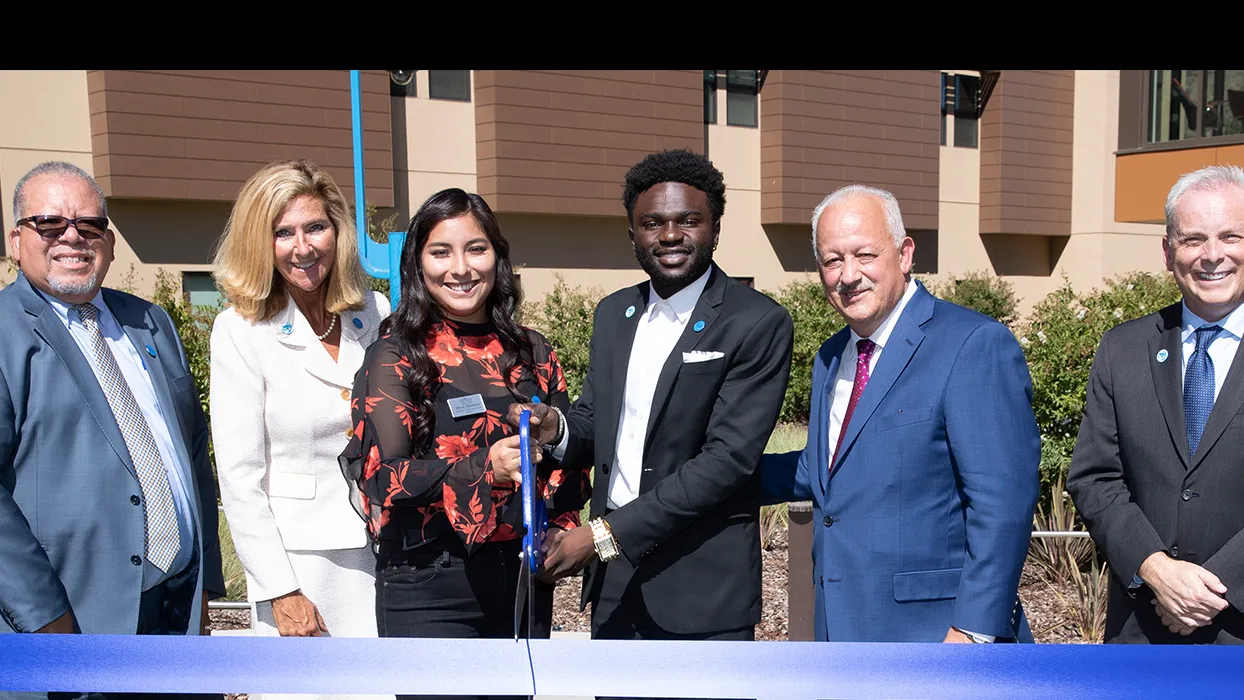Joe Gutierrez Office of Strategic Communication 909-537-5007 joeg@csusb.edu

To celebrate the grand opening of Cal State San Bernardino’s new on-campus student housing community and dining complex, Coyote Village and Coyote Commons, the university hosted a ribbon-cutting event on Sept. 17 in the courtyard of Coyote Village.The event featured several speakers, including CSUSB President Tomás D. Morales; Harry Le Grande, interim vice president of Student Affairs; Shari McMahan, provost and vice president of Academic Affairs; Douglas Freer, vice president of Administration and Finance; Helen Martinez, president of Residence Hall Association; Prince Ogidikpe, president of Associated Students Inc. (ASI); and John Yaun, assistant vice president of Student Affairs for Housing and Strategic Initiatives.“Nearly 24 months ago we gathered to officially break ground on the single largest development project in our history,” Morales said during the event. “Today, we are back to cut the ribbon on Coyote Village residence hall and Coyote Commons dining hall, two magnificent facilities that mark a major evolutionary step for this university.”Morales recognized many departments that played a role in the project, including Facilities Planning & Management, Student Affairs, Housing & Residential Education, and ASI, as well as former vice president for Student Affairs, Brian Haynes.“Standing here alongside these beautiful new buildings, it is both satisfying and inspiring to see the realization of this part of the Campus Master Plan, which serves as the roadmap as we continue to grow as a university,” Morales said.“I know Coyote Village and Coyote Commons will quickly become an integral part of our campus. It also is another great example of how, at CSUSB, we define the future,” he concluded.Coyote Village is 114,000 square feet and offers more than 400 beds for first-year students. The new facility features study and living spaces, a large multipurpose room, a community kitchen, a spacious courtyard, a dedicated wing for the university’s Honors Program, and will be home to two faculty members participating in the faculty-in-residence program during the 2018-19 academic year. This is the first phase of a larger residential community that will eventually serve an additional 1,200 students.Coyote Commons, adjacent to Coyote Village, is 50,300 square feet and is open to all students, faculty and staff. The dining hall features a full range of cuisines, both self-serve and full-service food stations, late-night dining, a convenience store and outdoor spaces for meetings and social functions. Coyote Commons can seat up to 700 people in its dining area and has a 50-seat mezzanine and private dining room. All food stations will offer vegan and vegetarian options.The new student housing community and dining complex is the largest single capital project in the university’s history, costing $95.8 million, which is funded through rental rates of students living in the residence halls. No state general fund dollars were committed to this project.Both Coyote Village and Coyote Commons are LEED (Leadership in Energy and Environmental Design) Gold certified, the most widely used green building rating system in the world.For hours of operation and additional information about the new dining complex, visit the Coyote Commons website.For more information about the new student housing community, visit the Coyote Village website.